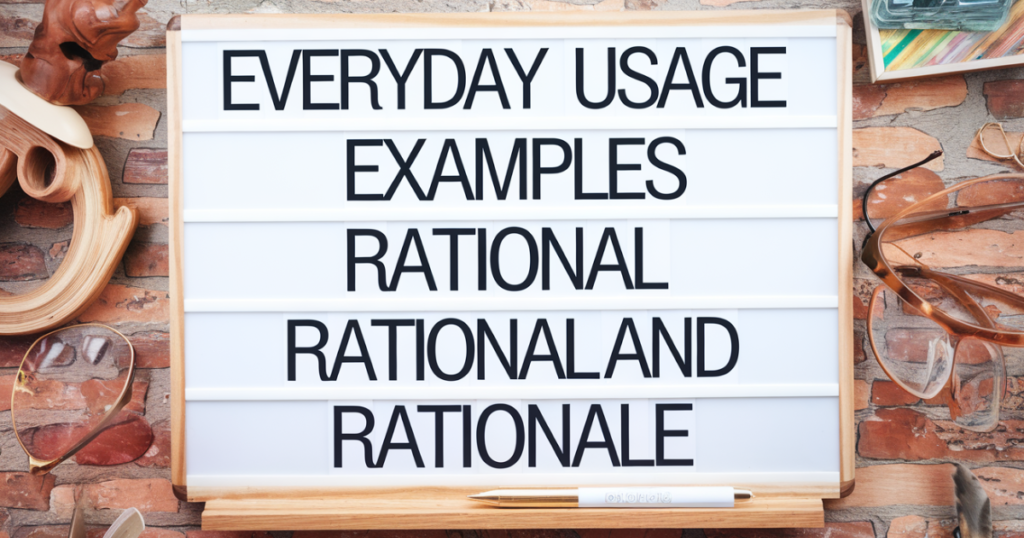When writing or speaking, it’s easy to confuse rational or rationale since they sound similar and share linguistic roots. However, these two words have distinct meanings and uses, which can lead to confusion if misused. Understanding the difference is crucial for clear and effective communication, especially in academic or professional settings.
“Rational” refers to being logical, reasonable, or based on sound judgment, while “rationale” is a noun meaning the underlying reason or explanation for something. Knowing when to use each word not only sharpens your language skills but also helps convey your thoughts more precisely. Let’s dive into their definitions and explore how to use them correctly.
Understanding “Rational” And “Rationale”

Rational(Logical or Reasonable): Definition and Usage
“Rational” is an adjective used to describe someone or something that is logical, reasonable, or based on clear thinking. It refers to decisions, actions, or beliefs grounded in logic rather than emotions or impulses.
Examples:
- She made a rational choice to save money instead of spending it impulsively.
- His argument was rational and backed by solid evidence.
“Rational” refers to being logical and reasonable, focusing on clear thinking and sound judgment.
You Also Like To Read This: Cubical Or Cubicle: Which One Fits Your Space?
Rationale(A Reason for Doing Something): Definition and Usage
“Rationale” is a noun that refers to the underlying reason or explanation for a decision, belief, or action. It describes the logical basis that justifies why something is done in a particular way. People often use “rationale” to explain the reasoning behind policies, plans, or choices.
Examples:
- The rationale for implementing new safety measures was to protect workers from potential hazards.
- She presented a clear rationale for changing the project’s timeline.
The term “rationale” emphasizes the importance of logical thinking and justification. It helps others understand the reasoning behind specific actions or decisions.
Side-by-Side Comparison
| Aspect | Rational | Rationale |
| Definition | Logical, reasonable, or based on sound judgment | The underlying reason or explanation for something |
| Usage Type | Adjective | Noun |
| Example 1 | It’s rational to save money for emergencies. | The rationale behind the policy is to ensure safety. |
| Example 2 | His rational thinking helped solve the problem. | She explained the rationale for the changes in detail. |
| Context | Used to describe actions or thoughts based on reason | Used to give the reasoning or motivation behind an action |
Understanding the difference between “rational” and “rationale” can clarify communication and improve writing precision. “Rational” describes actions or thoughts grounded in reason and logical thinking, while “rationale” refers to the explanation or reasoning behind a decision.
Using these terms correctly can help articulate ideas more effectively, ensuring clarity for readers or listeners. Recognizing when to use an adjective or a noun is key to making your language more accurate and impactful.
Everyday Usage Examples

Rational
- It’s rational to prepare for potential risks before starting a business.
- Her explanation seemed rational, so everyone agreed with the plan.
- Making a rational decision requires analyzing all the facts available.
- He stayed calm and rational even in a stressful situation.
Rationale
- The rationale for increasing prices was to cover rising production costs.
- She explained the rationale behind her decision to leave the company.
- The project manager provided a clear rationale for choosing the new software.
- The rationale for the new law was to improve public safety.
FAQs
What is the difference between rational and rationale?
“Rational” describes logical thinking, while “rationale” refers to the reasoning behind a decision.
What does rationale also mean?
Rationale can also mean the explanation or underlying principle for an action or idea.
What is the difference between rationale and reason?
“Rationale” is a structured explanation, whereas “reason” is a simpler cause or justification.
What is your rational?
It’s likely a misphrased question; it should be “What is your rationale?” asking for the reason or logic behind your actions.
Conclusion
In conclusion, while “rational” and “rationale” are related, they serve distinct roles in language. “Rational” describes the logical or reasonable approach to thinking or behavior, often tied to decision-making. On the other hand, “rationale” refers to the specific reasoning or justification behind an action or idea.
Understanding the difference between these terms helps in articulating thoughts clearly. By using them correctly, we can communicate more effectively, especially when discussing logic or reasoning behind decisions.

Grammerlytips.com, authored by Jame, offers expert tips and insights on mastering grammar, enhancing writing skills, and boosting communication effectiveness.

